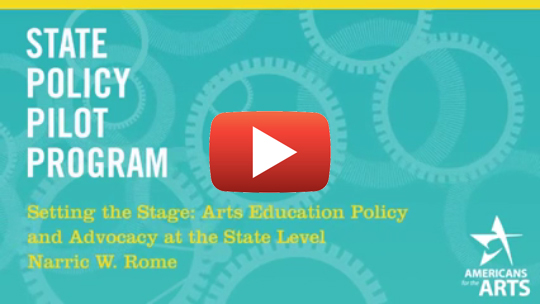8:30am: Breakfast
9:00am - 12:00pm: Briefings
Welcome and Overview of the Day
Narric W. Rome, Vice President of Government Affairs and Arts Education at Americans for the Arts, will welcome attendees, outline the goals of the briefing, provide an overview for the day, and welcome student performers.
Setting the Stage: Arts Education Policy and Advocacy at the State Level
In 2014, Americans for the Arts launched the State Policy Pilot Program (SP3). After three years, five convenings, many reports, grants, and technical assistance—the program has concluded, and arts education policy has advanced in ten pilot states. This opening session will provide an overview of the program, summarize the data collected to inform the field, and provide an overview of the overarching themes presented by team members in the ten pilot states.
Presenter: Narric W. Rome, Americans for the Arts (Transcript)
Navigating to Policy Success: The Findings, Outcomes, and Response to the State Policy Pilot Program (SP3)
Each state team within SP3 is different, facing unique challenges and successes and ultimately pursued diverse policy goals during the three-year program. Whether developing an existing program or embarking on a new policy endeavor, the pilot cohort tackled complex and intriguing policy objectives throughout the program, and key themes could be observed. A panel of participants will respond to the information presented and suggest next steps for the field.
Presenter & Moderator: Jeff M. Poulin, Americans fort the Arts (Transcript)
Respondents: Jeremy Anderson, Education Commission of the States (Transcript); Pam Paulson, The College Board (Transcript); and Guests (Transcript)
Advocacy Strategies for Arts Education: The Good, the Bad, and the Innovative
During the three years of SP3, the political and educational landscape shifted with: the passage of the Every Student Succeeds Act (ESSA), change in the presidential administration, and state educational leadership. The strategies and tactics implemented by SP3 teams had to remain agile and responsive. This panel will explore the advocacy strategies employed by teams to advance their arts education initiatives.
Presenter & Moderator: Elisabeth Dorman, Americans for the Arts (Transcript)
Respondents: Lana Hallmark, Arkansas Department of Education (Transcript); Wendy Liscow, Geraldine R. Dodge Foundation (Transcript); Andrew Baumann, Global Strategies Group (Transcript); Questions & Answers (Transcript)
12:00pm - 1:00pm: Lunch
1:15pm - 2:30pm: Breakout Sessions
Using the Arts to Achieve the Goals of Title I
Many communities recognize the role of the arts to achieve the goals of Title I. Creating a policy pathway to allow for Title I funding to flow to arts programs in communities through state education agencies was a focus of several SP3 states. This session will explore those pathways and envision next steps for state policy-makers.
Moderator: Narric Rome, Americans for the Arts
Presenters: Mary Reece, Principals and Supervisors Association
Respondents: Dalouge Smith, San Diego Youth Symphony; Myran Parker-Brass, Boston Public Schools
Resource: www.TitleIArts.org
Crafting Messaging for Arts Education: Sample Advocacy Campaigns
Spreading the word about the transformative power of arts education is a vital role of every arts education advocate, but unifying the message with clear, concise asks is critical for a successful advocacy campaign. This session will explore the work of several teams who engaged messaging campaigns to advance arts education through policy.
Moderator: Elisabeth Dorman, Americans for the Arts
Presenter: Tracie Konopinski, MASSCreative
Respondent: Joe Landon, California Alliance for Arts Education
Resource: www.ArtsEdNow.org
Towards Advocacy Infrastructure: Networking Rural Arts Education Leaders
Rural states face many challenges in access and delivery of arts education. Building and maintaining advocacy infrastructure is no different. This session will explore examples of successes and challenges faced by rural statewide advocacy initiatives.
Moderator: Jeff M. Poulin, Americans for the Arts
Presenter: Craig Welle, Arkansas Arts for Learning
Respondent: Laura Forbes, Alaska State Council on the Arts
Resource: Leveraging Change—Increasing Access to Arts Education in Rural Areas
2:30pm - 2:45pm: Snack Break
2:45pm - 4:00pm: Breakout Sessions
Using Data to Drive Educational Decision Making and Advocacy for Arts Education
Data is key to decision making. However, collecting and disseminating data for policy development and advocacy initiatives can be challenging. This session will explore two models of collecting arts education data and how it was used to drive policy for arts education.
Moderator: Narric Rome, Americans for the Arts
Presenter: Ann Marie Miller, ArtPride NJ
Respondent: Julie Richard, Maine Arts Commission
Resource: The State Status Report: A Review of State and Regional Arts Education Studies (2015)
The Status of 2014 National Arts Education Standards (And How We Got There)
The 2014 release of the National Core Arts Standards provided a framework by which many states have reviewed and adopted new arts education standards. This session will explore the current status of arts education standards in each state and the adoption processes utilized.
Moderator: Jeff M. Poulin, Americans for the Arts
Presenters: Leon Kuehner, Iowa Alliance for Arts Education; Jonathan VanderBrug, Arts Alliance Illinois
Resource: The Status of Arts Standards Revision in the United States Since 2014
Weathering the Political Storm: Statewide Arts Education Initiatives
Several states across the national have innovative statewide arts education initiatives, which are often tied to specific funding or policy endeavors of elected officials. How these initiatives succeed over time through political and funding shifts will be explored in this session.
Moderator: Elisabeth Dorman, Americans for the Arts
Presenters: Pam Paulson, Perpich Center for Arts Education, Michelle Burrows, National A+ Schools Consortium
Resource: Navigating the Changing Political Landscape (Jeremy Anderson, ECS)
State ESSA Plans: Where are the Arts in the Mix?
With the passage of the Every Student Succeeds Act, states had to adapt their plans of work to encompass the new shift in federal – and now state – policy. This session will explore the tactics used to respond to changing state policy.
Moderator: Deb Vaughn, Oregon Arts Commission
Presenters: Sarah Triplett, Creative Many Michigan; Jonathan Rappaport, Arts|Learning
Resource: ESSA and the Arts (Arts Education Partnership, 2017)
4:00pm - 4:30pm: Share Out, Reflection, and Closing
Participants will return to the larger group to share out the key points of discussion from break out sessions and hear closing remarks from the Americans for the Arts’ Arts Education Team








